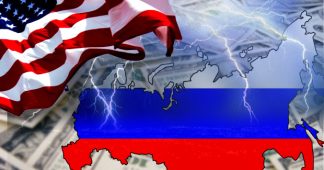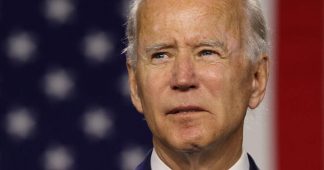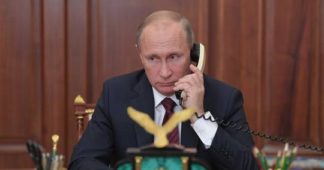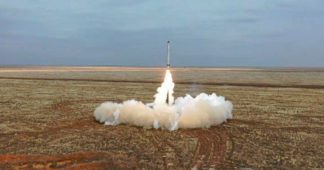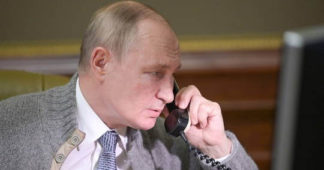What fundamental U.S. interest is being served by Biden’s intervention in Ukraine, and at what cost?
By Peter Van Buren*
Apr. 4, 2022
Does anyone know what Joe Biden is doing in Ukraine? Americans must feel like a high school substitute teacher. We turn our backs for five minutes and Joe Biden has restarted the Cold War. No grave address to the nation, no white papers, just “Democracy on the line.” Didn’t we used to vote on this kind of thing?
Engagement is somehow taken as a given. But what is the end point for Joe? What does victory look like? In Ukraine, no one knows. By starting this intervention by promising not to send NATO into combat, Biden sent a clear signal to Putin that, if he is willing to make the effort and use his overwhelming military advantage, he will win. Putin’s goal is to create a sort of buffer state between Russia and NATO; Putin can win whether Kiev rules or tumbles. A “win” for the U.S. side requires Putin to retreat in shame. Breaking things is always easier than getting someone to admit they were wrong.
Biden has two weapons to deploy: guns and sanctions. Can either lead to a win?
If a win for Putin includes reducing Mariupol to Detroit, how will any of the weapons the U.S. sends matter? Infantry-based proxy ground warfare can forestall a Ukrainian defeat but not prevent it. Notice how Zelensky showcases photos of kids with guns and old women making Molotovs and then the Russians target “civilians” at an apartment complex? Biden’s strategy is apparently for Ukrainians to stay in their houses and be shelled until the Russians run out of shells and go home.
There are many reasons to be skeptical of claims that 15,000 Russians have died in Ukraine. That would be double the Americans killed on Iwo Jima, or on both sides at Gettysburg. It would equal ten years of Russian losses in Afghanistan, and be about four times the total U.S. losses in Iraq. Ukraine also claims to have killed six generals, six more than were killed in all the wars the U.S. has fought since World War Two.
The theory of sanctions is that they will place such as squeeze on Russian oligarchs that they will force Putin to withdraw from Ukraine. Putin, otherwise portrayed as a dictator who answers to no one, will supposedly listen to these men complain about their yachts and reverse a foreign policy that he otherwise believes benefits Russia in the long run.
The U.S. has been piling sanctions on these same oligarchs for decades, with a new round each time Putin moved against Georgia, Grozny, and Crimea. None of those sanctions compelled a withdrawal and none have stopped Putin from making his subsequent move against Ukraine. Effective, no, but points for creativity: There’s a plan to strip Putin’s “Eva Braun” (you can’t make this up) of her Olympic medals in hopes she’ll withhold nooky Lysistrata-like until Putin withdraws.
Another problem with sanctions is they are nowhere near strong enough to actually hurt. Goofy yacht warfare aside, Biden’s ban on Russian petroleum accounts for only some 1 percent of Russia’s output. NATO allies are not able to participate fully without crippling their own economies. But loopholes amid half-measures are only part of the problem. Having grown accustomed to casually slapping sanctions on defenseless countries like North Korea, Biden has limited understanding of the effects of sanctions on a globally connected economy. Such sanctions have the potential to cause grave fallout because unlike, say, Cuba, Russia can fight back.
Though the goal of sanctions is to punish specific Russians, known by name, in a position to influence Putin, concern from world markets drove up prices of crude oil, natural gas, wheat, copper, nickel, aluminum, fertilizers, and gold. Grain and metals shortages now loom, even in early days of this spillover effect. Biden seems unaware that the world is interconnected. Millions are at risk of starvation in Africa if grain exports dry up.
While the cost of these sanctions to oligarchs is unknown, the effect on economies the U.S. should be courting, not hurting, is clear. Central Asia’s economies are now caught up in sanctions shock. These former Soviet states are strongly connected to the Russian economy through trade and outward labor migration. They will be as likely to blame the U.S. as Russia for their problems, converting potential U.S. allies into adversaries.
We have also yet to see what counter-moves Russia will make toward the West, to include nationalization of Western capital. Russian fertilizer export restrictions are putting pressure on global food production. Russia could also restrict exports of nickel, palladium, and industrial sapphires, needed for batteries, catalytic converters, and microchips.
Biden is in the process of discovering sanctions are a blunt instrument. He is unlikely to meet the diplomatic challenge of keeping the economic fallout from spilling over into political dissent across Europe—a region that is already unsure where it stands on “tough” sanctions.
Bad as all that sounds, some of the worst blowback from Biden’s Ukraine policy is happening in China. During the only Cold War years Biden apparently remembers, China was mostly a sideshow and certainly not vying to be the world’s largest economy. By failing to understand that the world is no longer bipolar—NATO versus the Pact—Joe Biden actually may be doing even more harm than he understands right now.
Russia is a big country that has committed only a small portion of its military to the war in Ukraine. It absolutely does not need Chinese help to prosecute the war, as Biden claims. Biden is unnecessarily antagonizing China, who should be more or less neutral in this fight but instead is being positioned by Biden as an enemy of the United States and an ally of Russia. China buys oil from Russia but that does not translate into some sort of across-the-board support for Russian foreign policy à la 1975.
Yet Biden—by threatening China with sanctions, linking Ukraine and Taiwan, and essentially demanding Beijing be with us or against us—threatens to turn China the wrong way. Beijing has, for example, already asked the Saudis to accept yuan over dollars for oil. Economic spillover from Russia is one thing, disturbing one of the world’s largest trading relationships is another.
As the Wall Street Journalpoints out, China’s basic approach of not endorsing Moscow’s aggression but resisting Western efforts to punish Russia has garnered global support. Of the ten most populous countries in the world, only the U.S. supports major economic sanctions against Russia. Indonesia, Nigeria, India, and Brazil have all condemned the Russian invasion, but do not seem prepared to implement the West’s preferred countermeasures. Quite the opposite, in fact. India and Russia will soon have currency swaps in place to finance trade in rupees and rubles, bypassing the U.S. sanctions regime against Russia. Biden seems oblivious to these gaps in U.S. policy.
In my own years as a diplomat I heard often from smaller countries’ representatives about the “America Tax,” the idea America’s unpredictable foreign-policy dalliances end up costing everyone something. Whether it is a military contribution to the Iraq War effort, or a disruption in shipping, nobody gets away free when America is on a crusade. This cost is built in to those smaller nations’ foreign policy. But when the Big Blind Dog, as a Canadian diplomat once characterized the U.S., starts in on sanctions that will have a global impact, the calculus changes. Smaller nations no longer offer a knowing sigh—the Americans are at it again. They feel real fear.
Many nations the U.S. needs in its alliances don’t trust our ability to manage or protect them from economic consequences, if America is even aware of those consequences. As America seeks to weaponize the global economic system, other nations fear U.S. moves against Russia’s central bank could one day be directed against them. Russia can weather a nasty storm; a smaller economy would be crippled. Chinese propaganda about the need for alternative economic arrangements limiting U.S. power is more influential now than a month ago.
In the end, we’re left with two questions: What fundamental U.S. interest is being served by Biden’s intervention in Ukraine, and at what cost? One response is the sort of go-to silliness that fuels Washington—lines about “standing up for what’s right” or the “clash of civilizations,” the jingoistic frame that tends to get people needlessly killed.
Biden has fallen into the Cold War trap. He cannot accept there is little that can be done about Ukraine. Every world problem is not America’s to resolve, and every world problem cannot be resolved by America. If he persists in his quixotic quest to defeat Putin, Biden may usher in a China-centric economic system to displace the Western one. Just as Iran was the real winner in the U.S.-Iraq wars, so may China be in this struggle. Unintended consequences are still consequences.
* Peter Van Buren is the author of We Meant Well: How I Helped Lose the Battle for the Hearts and Minds of the Iraqi People, Hooper’s War: A Novel of WWII Japan, and Ghosts of Tom Joad: A Story of the 99 Percent.
Published at www.theamericanconservative.com
We remind our readers that publication of articles on our site does not mean that we agree with what is written. Our policy is to publish anything which we consider of interest, so as to assist our readers in forming their opinions. Sometimes we even publish articles with which we totally disagree, since we believe it is important for our readers to be informed on as wide a spectrum of views as possible.
